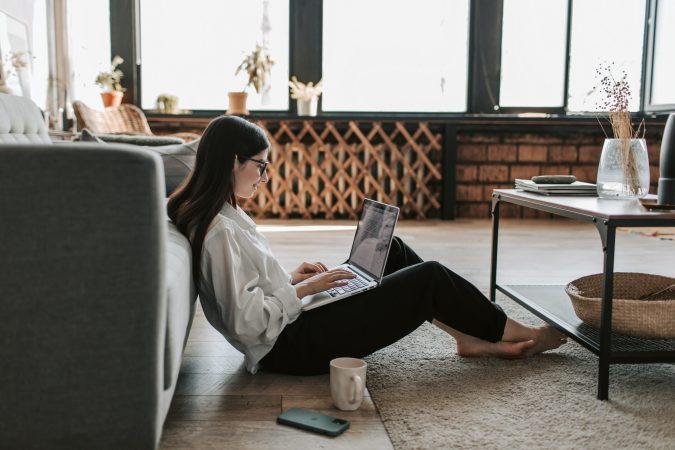


Even with gyms reopening at limited capacity, it’s still safer to exercise at home or outdoors. So, we’re dubbing this September Muscle Month to help you keep up your fitness, power, and health in socially distant times.
—
Now that summer is almost over, it’s time to double down on work and school. But hours spent glued to a desk chair shouldn’t come at the cost of your fitness.
You might think you can’t get injured while working your office job, says Rudy Gehrman, a chiropractor and the CEO of Physio Logic, a New York City-based physical wellness center. But sitting for long periods, especially with bad posture, will compress your muscle fibers and spine. “That long-term compression and flexion will eventually wear out the discs in your spine and lead to degenerative changes,” Gehrman explains.
But never fear, there are a few simple exercises you can do from your chair to keep your body limber and your muscles in good shape. Let’s move through them together with help from Gehrman and his wife Lynda, who runs a pilates studio.
Seated leg lifts and calf stretches
Extend the uses of your regular old desk chair by swapping it for a gym bench. This exercise will tone your quads and stretch your calves, all while engaging your core. You’ll get a full lower-body workout without getting up from your seat.
- Sit in your chair with a straight spine and your shoulders pulled back. Rest your arms on your desk.
- Keeping one leg in place with your foot flat on the ground, raise the other leg so that it’s parallel to the ground. Make sure your posture doesn’t change. You should feel the muscles in your quad working, and maybe your abs as well.
- Slowly flex the foot of your raised leg until it’s perpendicular to your leg, stretching your calf. Hold for 10 seconds, then unflex.
- Lower your leg and do the move on the other side.
- Repeat until you’ve done 10 lifts on each leg.
Arm circles

This movement is perfect for toning your arms, shoulders, and upper back. Depending on how you choose to position your hands (palms up, down, or facing behind you) and how large your circles are, you can target different muscle groups. Add 2- to 5-pound weights if you feel you need greater resistance.
- Sit up straight with your shoulders back.
- Hold your arms out so that they’re parallel to the floor with your palms in the desired position. Don’t lock your elbows; they should be in a straight line with your body.
- Keeping your arms taut, circle them forward 10 times. Your palms should stay facing their original direction. Keep your circles medium size (about the radius of a watermelon).
- Reverse the movement and do 10 circles backwards.
- Try repeating this exercise but with varied circle sizes. Go as tight as a softball, or as wide as your shoulder can rotate, while keeping proper form.
- Try the same number of reps with different hand positions: palms up, palms down, and palms facing behind you.
Neck look-backs

All those hours spent peering at your screen will do a number on your neck and back. This not only affects your posture but also the strength of your muscles. A strong, straight neck is important to prevent injury, whether you’re lifting heavy boxes or doing some light yoga.
- Sit up straight with your shoulders pulled back, feet planted on the ground, and your head facing forward.
- Slowly turn your head to look over one shoulder, raising your chin so that your gaze is elevated. Make sure to keep your posture straight.
- Hold for five seconds before returning to your original position.
- Repeat on the other side.
- Do three sets.
Stomach hollows
Your core consists of all the muscles near and around your belly button: your lower back, obliques, and abdominal. A strong and healthy core is important for everything from good posture to running to weightlifting. Try this seated ab workout to hit the most crucial spots.
- Sit up straight and look forward.
- Exhale deeply and pull in your stomach. Imagine a string pulling your belly button towards your spine.
- Keep pulling in as far as you can go, and hold for 10 seconds. Remember to breathe.
- Slowly release until you’re back in resting position.
- Repeat 10 times.
Overhead presses

Another one for the arms and shoulders, this feels pretty similar to raising the roof on the dance floor. The key difference is to keep all your muscles tight and engaged to ensure that the move is actually working them out. Add a book or a medicine ball to ramp up the difficulty.
- Sit up straight with shoulders back.
- Raise and bend your arms so that your hands are near the top of your head with your palms facing the ceiling.
- Slowly push and extend your arms upward while squeezing your biceps, triceps, shoulders, and core. Don’t lock your elbows once you get to the end of the motion.
- Slowly bring your arms back down to the bent position and repeat 10 times.
Glute squeezes

The gluteus maximus is the biggest muscle in the body, so it’s important to keep it in tip-top shape. A robust backside can be a big help while running, swimming, and climbing stairs.
- Sit up straight with your shoulders pulled back, feet planted on the ground, and your head facing forward.
- Slowly clench your butt cheeks. Hold for five seconds once you can’t squeeze anymore.
- Slowly unclench, and repeat 10 times.















